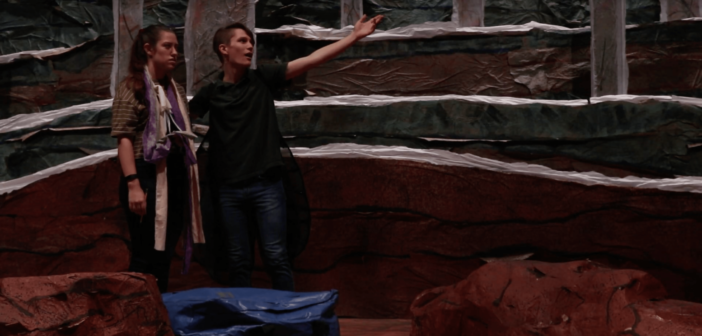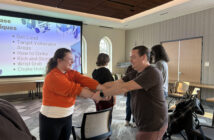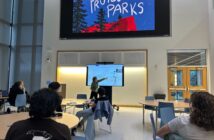“The Broken Machine,” a play inspired by the 2018 California wildfires, is set to premiere Nov. 15 in Diamond Theater at Zoellner Arts Center, as new wildfires rage in California.
“The play is incredibly timely,” said Pam Pepper, director and professor in the Department of Theatre. “It’s about love. It’s about the consequences of our actions. It’s about the broken machine of our world.”
“The Broken Machine” is written by award-winning playwright Liz Duffy Adams, the Theodore U. Horger ‘61 endowed artist-in-residence for the performing and visual arts.
Adams was inspired to write the play after spending the summer in California, as the wildfires were ravaging the Golden State.
She attended a writing retreat upon returning to New York, where the lingering memory of the Pacific Coast trickled into her script.
“I don’t work beginning with themes, or consciously to begin with,” Adams said. “I believe that all plays are political plays, because we live in a political context.”
Adams said it is the responsibility of every playwright to pay attention to what is happening around the world.
To be human is to be alive and present, she said—that awareness drives the inner workings of her play and its characters.
The play follows the journey of the Broken Machine, a computer programmer who escapes to the woods after the World Wide Web crashes.
She befriends a gray fox before a large fire breaks out at 25 miles per hour. From there, the two encounter a pair of park rangers and a psychopomp, a mythical creature who guides deceased souls to the afterlife.
“I like characters who are secretly, or literally, not human,” Adams said.
With a play that revolves around the destruction of the natural world, Adams wanted to create non-human characters who portray the forces of nature.
Fleeing the fires in the wilderness, the five characters are still grounded with real-life motivations and impetuous measures.
“Their purpose in the play is not to serve the audience,” said Vaughan Kramer, ‘22, an actor in the play. “It’s to serve their values, and themselves.”
Commissioned by the Department of Theatre, “The Broken Machine” is brand new—a treat and a challenge.
With no prior references, Pepper and her cast members have the freedom to interpret what the playwright sees and hears in her head.
Playing one of the two rangers, Kramer looks at the characters with the perspective of how they see themselves. Stripping away his biases, Kramer said he tries to let the script speak for itself, creating a world driven by Adams’ imagination.
“My job, as the director, is to do my very best to bring the playwright’s work to life in the way she intended it,” Pepper said. “We’re creating from the ground up. I love that part of the process.”
The creative process became a round-the-clock dialogue between two parties. Part of the conversation involved the stagings for the production.
The 80-minute play takes place in three locations—inside the broken machine’s hut, in the middle of the woods and on the beach.
To avoid the distraction of changing scenery, the stage is heavily layered. Weathered tree trunks are stacked behind levels of eroded land.
“The Broken Machine” is by no means a Broadway musical, but it still incorporates musical elements. The actors perform short songs as a channel to communicate their longings to the audience.
For example, “Don’t Fence Me In,” conveys the yearning of the characters who seek refuge from the wildfires, and represents their desire to be untethered and free. But freedom of action does not mean freedom from its consequences.
Kramer hopes the audience leaves “The Broken Machine” not only thinking about climate chaos, but also being entertained by how that thought is delivered.
“It’s a message that needs to be said, repeated and pounded into people’s heads,” Kramer said. “But the way it’s conveyed is so interesting, so funny and so heartbreaking at times.”
“The Broken Machine” will run from Nov. 15-16, and Nov. 20-22, at 7:30 p.m. at the Diamond Theater in Zoellner Arts Center. An afternoon production will also be shown on Nov. 17, at 2 p.m. Tickets are free for Lehigh University undergraduate students.






Comment policy
Comments posted to The Brown and White website are reviewed by a moderator before being approved. Incendiary speech or harassing language, including comments targeted at individuals, may be deemed unacceptable and not published. Spam and other soliciting will also be declined.
The Brown and White also reserves the right to not publish entirely anonymous comments.